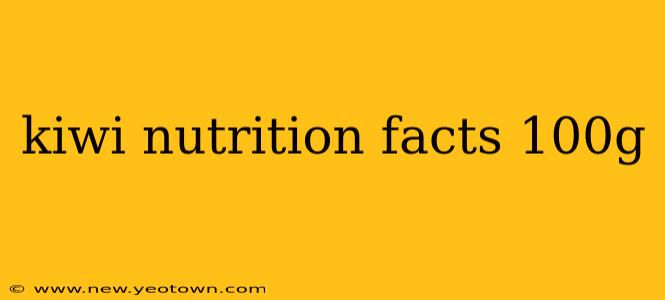The humble kiwi, a fuzzy brown fruit hiding a vibrant green (or sometimes gold!) interior, is more than just a delicious treat. This small package is bursting with nutrients, making it a nutritional powerhouse. Let's delve into the detailed nutrition facts for a 100g serving of this amazing fruit and uncover why it deserves a prominent spot in your diet.
Kiwi Nutrition Facts (per 100g)
Before we dive into the specifics, it's important to note that the exact nutritional content of a kiwi can vary slightly depending on factors like the variety, growing conditions, and ripeness. However, a general average for a 100g serving provides a solid picture:
- Calories: Approximately 61 calories
- Carbohydrates: Around 15g (including about 9g of sugar)
- Fiber: A significant 3g
- Protein: Around 1g
- Fat: Negligible (less than 1g)
- Vitamin C: A whopping 154% of the recommended daily intake (RDI)!
- Vitamin K: A good source, contributing around 35% of the RDI.
- Vitamin E: A decent amount contributing to your daily needs.
- Potassium: A good source of this essential mineral.
- Folate: Contributes to your daily needs.
This is just a snapshot. Let's explore some frequently asked questions about kiwi nutrition.
How many vitamins are in a kiwi?
Kiwis are nutritional champions, boasting a impressive array of vitamins and minerals. As you can see from the nutrition facts above, Vitamin C takes center stage, providing a massive percentage of your daily needs. But don't overlook the significant amounts of Vitamin K, Vitamin E, and various B vitamins that contribute to overall health and well-being. This makes kiwi a true multivitamin in fruit form!
What are the benefits of eating kiwi?
The impressive nutrient profile of kiwi translates into a variety of health benefits. The high Vitamin C content is a powerful antioxidant, boosting your immune system and protecting your cells from damage. The fiber content aids digestion and promotes gut health. The potassium contributes to maintaining healthy blood pressure. Studies have even linked kiwi consumption to improved sleep quality and reduced risk of certain chronic diseases.
Is kiwi good for weight loss?
Because of its low calorie count and high fiber content, kiwi can be a helpful addition to a weight management plan. The fiber helps you feel full and satisfied, potentially reducing overall calorie intake. Remember, however, that weight loss is a complex process that requires a balanced diet and regular exercise. Kiwi can be a valuable tool, but it's not a magic bullet.
Are kiwis good for your skin?
The antioxidant properties of kiwi, particularly from Vitamin C and other compounds, can contribute to healthy, radiant skin. These antioxidants help protect your skin from damage caused by free radicals, potentially reducing the signs of aging and improving overall skin tone.
What are the potential side effects of eating too many kiwis?
While generally safe, consuming excessive amounts of kiwi could lead to some minor digestive issues in sensitive individuals. The high acidity might cause heartburn or upset stomach in some. Moderation is key, as with most foods.
Conclusion: A Daily Dose of Deliciousness
The kiwi fruit is a tiny nutritional powerhouse that deserves a prominent place in your diet. Its vibrant flavor and impressive nutrient profile make it a delicious and healthy choice that supports overall well-being. So, go ahead and enjoy the vibrant taste of this superfood! Remember, a balanced diet rich in various fruits and vegetables is key to optimal health.

